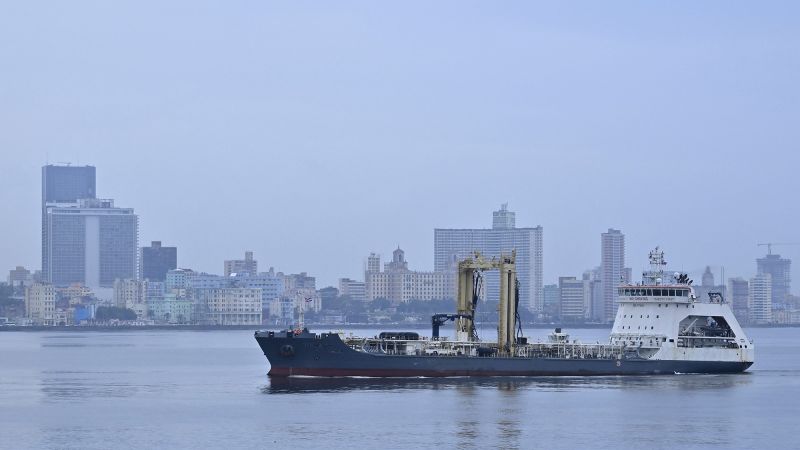CNN
—
A group of Russian Navy ships, including a nuclear-powered submarine, arrived in Cuba on Wednesday morning in a sign of strengthening ties between the two Cold War allies.
Russian frigate Admiral Gorshkov – the first of a four-ship convoy – fired a 21-gun salute after entering Havana harbor, which was answered by the Cubans with cannon fire from an 18th-century colonial fort built by the Spanish to guard the port.
The Gorshkov is one of the Russian Navy’s most modern ships, and was followed by the nuclear-powered submarine Kazan, a rescue tug, and an oil tanker.
03:06 – Source: CNN
Cruise ship passenger snaps pictures of Russian warships headed to Cuba
It marks the largest show of force by the Russians with their longstanding ally Cuba in many years. The US assesses that the Kazan does not have nuclear weapons on board, a US official said.
The vessels will carry out a five-day official visit to the Caribbean island – a show of Russian force just 90 miles from Florida as tensions rise between the US and Russia over the war in Ukraine.
Cubans will be permitted to tour the frigate following the arrival of the convoy of ships, a Russian diplomatic source told CNN.
The Russian diplomat told CNN that starting Thursday, “the general public” in Cuba will be allowed to tour the Gorshkov frigate for four hours each day for three days. Military analysts believe it is capable of long-range missions, anti-submarine warfare, and carrying surface-to-surface and surface-to-air missiles, among other weapons systems.
Adalberto Roque/AFP/Getty Images
The Russian nuclear-powered submarine Kazan (left) and the class frigate Admiral Gorshkov, part of the Russian naval detachment visiting Cuba, arrive at Havana’s harbour, June 12, 2024.
En route to Cuba, the Russian warships conducted drills in the Atlantic, the Russian Ministry of Defense said Tuesday.
The crews of the frigate and the nuclear submarine missile cruiser practiced the use of high-precision missile weapons using computer simulation for naval targets, designating ship groupings of a simulated enemy located at a distance of over 600 km, according to the Russian MOD, Russian state media TASS reports.
US officials told CNN that the US military had deployed ships and planes to monitor Russia’s military exercises in the Atlantic and the Caribbean, and has been tracking the Russian vessels as they transited the Atlantic in recent days en route to Cuba.
US Navy ships that have been tracking the Russian vessels include the USS Truxtun, the USS Donald Cook, and Coast Guard vessel the USCGC Stone, the US official confirmed. The US has also deployed air assets, including a P-8 Poseidon reconnaissance plane, to circle overhead the Russian vessels. Canada has also deployed assets to monitor the activity, the official said.
The official added that the US has been monitoring the flotilla’s movements “the whole time,” which is a normal part of the US’ maritime homeland defense, and all vessels including the Russians have remained in international waters.
Pentagon and State Department officials have also sought to emphasize that the Russian activity is routine and poses no threat to the US, and have noted that Cuba has hosted Russian ships every year between 2013 and 2020.
Still, the Russian transit to the region comes at a particularly tense moment between Washington and Moscow, several weeks after President Joe Biden agreed to allow Ukraine to strike inside Russia directly using US-provided weapons.
CNN
The rescue and tugboat Nicolay Chiker, part of the Russian naval detachment visiting Cuba, arrives at Havana’s harbour, June 12, 2024.
Cuba said last week that such visits were standard practice by naval units from countries friendly to Havana, and insisted the stopover does not represent a threat to the region.
“Visits by naval units from other countries are a historical practice of the revolutionary government with nations that maintain relations of friendship and collaboration,” a statement from Cuba’s Foreign Ministry said.
According to a Cuban Armed Forces Ministry statement, none of the Russian ships are armed with nuclear weapons.
Cuba has long had good relations with Russia. It was a key ally to the former Soviet Union during the Cold War that briefly hosted nuclear missiles at Moscow’s behest during the 1962 Cuban Missile Crisis.
The arrival of the ships on Wednesday signals Moscow’s strengthening ties with Havana in light of Russia’s war in Ukraine. Cuba is also increasingly reliant on Russian oil and aid as the communist-run country weathers its worst economic crisis in decades.








:max_bytes(150000):strip_icc()/roundup-writereditor-loved-deals-tout-f5de51f85de145b2b1eb99cdb7b6cb84.jpg)


